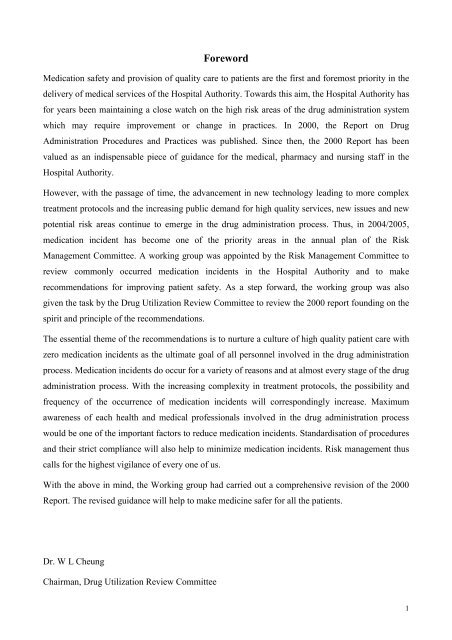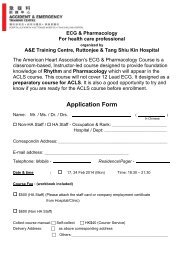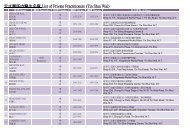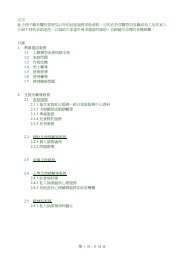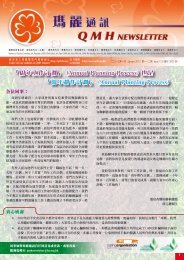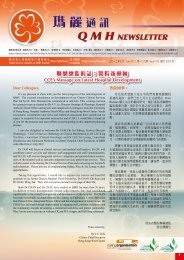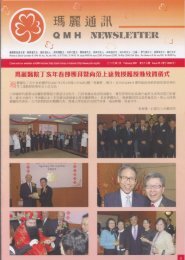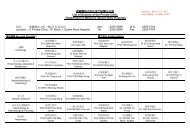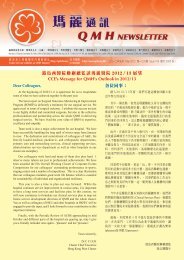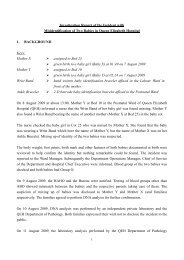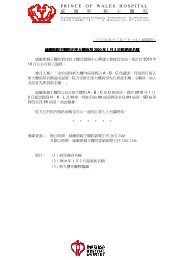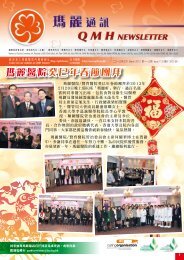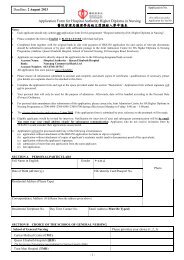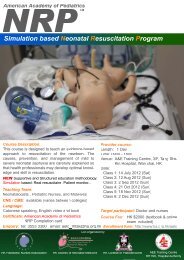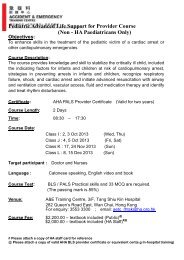2005 Edition Report on Drug Administration Procedure & Practices ...
2005 Edition Report on Drug Administration Procedure & Practices ...
2005 Edition Report on Drug Administration Procedure & Practices ...
You also want an ePaper? Increase the reach of your titles
YUMPU automatically turns print PDFs into web optimized ePapers that Google loves.
ForewordMedicati<strong>on</strong> safety and provisi<strong>on</strong> of quality care to patients are the first and foremost priority in thedelivery of medical services of the Hospital Authority. Towards this aim, the Hospital Authority hasfor years been maintaining a close watch <strong>on</strong> the high risk areas of the drug administrati<strong>on</strong> systemwhich may require improvement or change in practices. In 2000, the <str<strong>on</strong>g>Report</str<strong>on</strong>g> <strong>on</strong> <strong>Drug</strong>Administrati<strong>on</strong> <strong>Procedure</strong>s and <strong>Practices</strong> was published. Since then, the 2000 <str<strong>on</strong>g>Report</str<strong>on</strong>g> has beenvalued as an indispensable piece of guidance for the medical, pharmacy and nursing staff in theHospital Authority.However, with the passage of time, the advancement in new technology leading to more complextreatment protocols and the increasing public demand for high quality services, new issues and newpotential risk areas c<strong>on</strong>tinue to emerge in the drug administrati<strong>on</strong> process. Thus, in 2004/<str<strong>on</strong>g>2005</str<strong>on</strong>g>,medicati<strong>on</strong> incident has become <strong>on</strong>e of the priority areas in the annual plan of the RiskManagement Committee. A working group was appointed by the Risk Management Committee toreview comm<strong>on</strong>ly occurred medicati<strong>on</strong> incidents in the Hospital Authority and to makerecommendati<strong>on</strong>s for improving patient safety. As a step forward, the working group was alsogiven the task by the <strong>Drug</strong> Utilizati<strong>on</strong> Review Committee to review the 2000 report founding <strong>on</strong> thespirit and principle of the recommendati<strong>on</strong>s.The essential theme of the recommendati<strong>on</strong>s is to nurture a culture of high quality patient care withzero medicati<strong>on</strong> incidents as the ultimate goal of all pers<strong>on</strong>nel involved in the drug administrati<strong>on</strong>process. Medicati<strong>on</strong> incidents do occur for a variety of reas<strong>on</strong>s and at almost every stage of the drugadministrati<strong>on</strong> process. With the increasing complexity in treatment protocols, the possibility andfrequency of the occurrence of medicati<strong>on</strong> incidents will corresp<strong>on</strong>dingly increase. Maximumawareness of each health and medical professi<strong>on</strong>als involved in the drug administrati<strong>on</strong> processwould be <strong>on</strong>e of the important factors to reduce medicati<strong>on</strong> incidents. Standardisati<strong>on</strong> of proceduresand their strict compliance will also help to minimize medicati<strong>on</strong> incidents. Risk management thuscalls for the highest vigilance of every <strong>on</strong>e of us.With the above in mind, the Working group had carried out a comprehensive revisi<strong>on</strong> of the 2000<str<strong>on</strong>g>Report</str<strong>on</strong>g>. The revised guidance will help to make medicine safer for all the patients.Dr. W L CheungChairman, <strong>Drug</strong> Utilizati<strong>on</strong> Review Committee1


